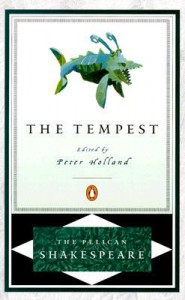Currently reading
The Adventures of Augie March
Image-Music-Text
Selected Poems and Four Plays
On the Edge of the Cold War: American Diplomats and Spies in Postwar Prague
 I have always felt a little slighted about my middle name - Prosper - even though it is felicitous in the most literal sense of the word, I have always been a bit put out by it's oddness. I inherited it from a great grandfather, or some other, who I have never met. But as the years of easy childish embarrassment recede, I find myself clinging to it with a newly forged appreciation, and in part it is because I have re-styled it as an homage to Prospero, à la Shakespeare's The Tempest.
I have always felt a little slighted about my middle name - Prosper - even though it is felicitous in the most literal sense of the word, I have always been a bit put out by it's oddness. I inherited it from a great grandfather, or some other, who I have never met. But as the years of easy childish embarrassment recede, I find myself clinging to it with a newly forged appreciation, and in part it is because I have re-styled it as an homage to Prospero, à la Shakespeare's The Tempest.Shakespeare's comedy, the last he purportedly wrote alone, is unique in that it is not comedic to readers in the same way as is Twelfth Night or The Taming of the Shrew, it is far more subtle, and also a bit somber, and maybe a bit cold. The problem I have with the classification of "comedy" as "ending with a wedding" is that it seems to be very trite, and the resolution in The Tempest is indeed a wedding and deathless resolution, everyone is forgiven by Prospero, Miranda marries Ferdinand, Naples and Milan are united, etc. And because the spirit of the play seems to many a bit ambiguous, it is often classified as a "Romance" alongside Cymbeline, Pericles, and A Winter's Tale, but this classification is a mistake. Miranda is not the central character, and her engagement to Ferdinand, while based on her own volition and love, can't break away from the role it plays in fulfilling Prospero's goal, as if it were only a cog in the overall machine of Prospero's plot. In addition, the play's "tragic" elements are often attributed to Caliban, who is oddly cast as a West Indian native, rather than the Sycoraxian amphibian that he is (leading to a host of post-colonialist interpretations that glorify the cowardly monster). That too is an error. The play is certainly a comedy - characters like Stephano and Trinculo make this very apparent, and very funny, as does the back-and-forth banter and bargaining between Prospero and Ariel.
But the play isn't Caliban's, it isn't Miranda's, and it isn't Ariel's - it's Prospero's. And Prospero has an almost chilly sangfroid at times, which cools the mood of the comedy. Though the play lacks in rollicking scenes of mistaken identity and sexual innuendo, it is comedic at the plot level. Prospero, the most powerful of Magi, and his complex rigmarole, all to overtake his insipid and foolish enemies - it's funny! How overwrought, over-prepared he is for what turns out to be mere folly.
But comedy aside, what strikes me most about The Tempest and particularly about the central Prospero, is how nearly it approaches the cusp of solipsism - the isle of Prospero's imprisonment is as close as any Shakespearean character comes to being "bounded in a nutshell... a king of infinite space." Prospero's dominion over the isle is complete, though he fashion's himself "master of a poor cell." And the play is Prospero's, all the stage is to his making and it is impossible to delineate if it is a nature or a mere artifice - the isle's closed cosmos is as much a dream controlled by Prospero as it is a stage controlled by stage-director, and all the characters are as much audience to Prospero's art as is the audience in the bleachers or behind the book. But this solipsism, this complete egotism, complete autonomy, is something Prospero wishes to give up for the pale shadow of his erstwhile governance of Milan - and this is the soupçon of solemnity when Prospero drown's his book.
Prospero in Milan seems to us an absurdity, a sort of George of the Jungle anatopism. Because it is impossible to resist the parody of Christianity which Prospero represents to us. There is no greater degree of solipsism than Deification, and Prospero nears that level of authority over his island (at least while it remains untrammeled upon by the Italian interlopers). But in Milan, he is a mere Duke, who can exercise only political control, which pales sadly in comparison to the supernatural or mystical control he has over his islet. And this seems a bit sad to us. Aren't we all a bit solipsistic? On some level don't we all want to be Kings of our dominions? And maybe for Prospero it's that we want most what we don't have. He doesn't seem motivated by revenge - he forgives Antonio with alacrity and composure; perhaps he renounces his egotism in favor of society life because it has become to him something he can't have, in the years of his exile it has renewed itself in novelty.




